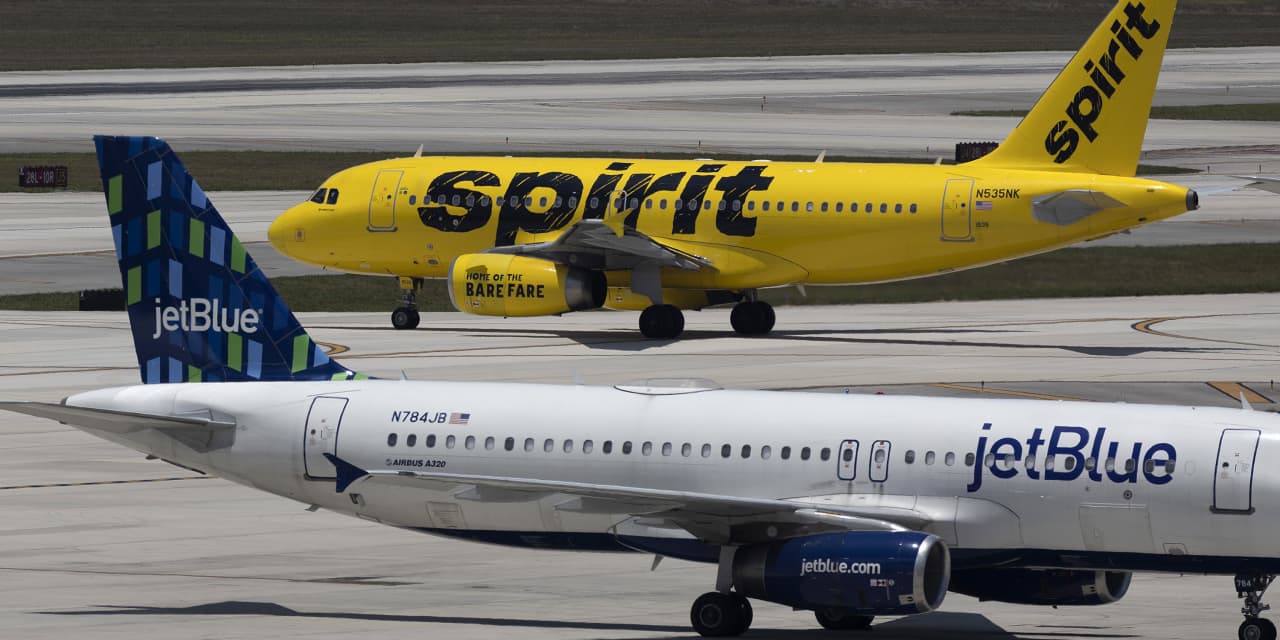The impending ruling in the
JetBlue Airways
and
Spirit Airlines
merger trial could shake up the entire industry. But whatever happens, the outcome will cause turbulence for airline stocks.
The proposed $3.8 billion deal would create the fifth-largest U.S. airline, and spawn a low-cost giant that is better placed to challenge the so-called Big Four–
United Airlines,
American Airlines,
Delta Air Lines,
and
Southwest Airlines.
The judgment is expected in January but it’s “too close to call,” according to Raymond James analyst Savanthi Syth. She sees a greater than 50% chance of success for
JetBlue
and Spirit but added that regulatory uncertainty “remains high.”
In the monthlong antitrust trial, the Department of Justice (DOJ) argued the merger will lead to higher fares and fewer choices for travelers, while JetBlue said the deal is pro-consumer and would enable it to challenge the dominant airlines.
The market hasn’t been able to confidently price in either outcome, leaving the stocks exposed to large movements when the ruling is made. It could also have a bearing on the proposed merger between
Alaska Air
and Hawaiian Airlines parent
Hawaiian Holdings.
Put simply, a win for the deal is likely to boost acquiree Spirit and have a positive read across for Hawaiian and put the acquirers JetBlue and Alaska under pressure.
Deutsche Bank
analysts noted that historically acquirers tend to underperform through the approval and integration process when it comes to airline mergers.
Investors also see it that way. Developments that have increased the chances of the merger being approved—for example JetBlue agreeing to sell Spirit assets to ease DOJ concerns—have typically led to Spirit stock rising, and JetBlue falling.
Short interest in JetBlue (traders betting against the airline’s shares) rose in the first half of December, but fell in Spirit—perhaps suggesting investors are leaning toward the deal being approved.
However, if the merger is rejected by District Court Judge William Young, “we could see Spirit’s share price collapse,” Deutsche Bank’s Michael Linenberg said in a note. He expects other airlines to benefit generally from more consolidation, albeit with less extreme share price moves for the Big Four.
The merger may create the fifth-largest U.S. airline, but it would still have a tough job challenging the dominance of the four biggest carriers—United, American, Delta and Southwest. The quartet accounted for 74% of domestic flight capacity in the December quarter, Linenberg said. In comparison, JetBlue and Spirit’s combined capacity made up just 10%.
Spirit has had a tough year, through the lens of investors, with a series of disappointing quarterly earnings reports. Analysts are forecasting a loss for the ultra-low-cost carrier in each of the next five quarters.
The shares are being supported by the pending JetBlue acquisition, TD Cowen analyst Helane Becker said ahead of the trial. “This implies significant downside if the DOJ wins the lawsuit against JetBlue and the deal breaks,” she added.
Even the upside for Spirit may not be quite as much as initially predicted. The original deal values Spirit at $33.50 per share, more than double its current level. However, some analysts expect JetBlue to attempt to renegotiate the price of the deal, in light of Spirit’s performance since the merger was agreed in October 2022.
The ruling also has implications for
Alaska Air
Group’s proposed purchase of Hawaiian Airlines’ parent Hawaiian Holdings. The mergers have different characteristics—Alaska and Hawaiian only overlap on 12 out of 1,400 daily flights—and the DOJ will of course scrutinize it on merit before deciding whether to attempt to block it.
However, a DOJ defeat in the JetBlue-Spirit case may be more likely to deter the Biden administration from blocking the Alaska-Hawaiian deal. On the flip side, a DOJ win may embolden it—at least that’s how the market will see it.
Hawaiian stock, in particular, could be set for a big move either way. The shares have surged around 180% since the deal was announced earlier this month. The offer price came with a 270% premium, so the shares have further upside if the odds of the deal being completed improve.
There’s also plenty of downside. If the judge rules against the merger, Deutsche’s Linenberg expects Hawaiian shares to be “a big underperformer” as investors factor in a lower probability of its Alaska deal being approved.
Alaska shares plunged 14% when it announced the agreement, so anything that heightens the chances of the deal being blocked is likely to boost the stock.
With the JetBlue-Spirit decision pretty much a 50-50 call, investors should brace for volatility as well as opportunity.
Write to Callum Keown at [email protected]
Read the full article here




